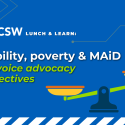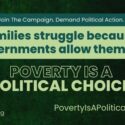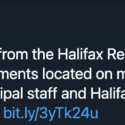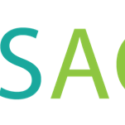FOR IMMEDIATE RELEASEFeb 18, 2025 KJIPUKTUK (HALIFAX, NS) – The Nova Scotia College of Social Workers (NSCSW) voices deep concern over the 2025-2026 provincial budget, which disregards critical investments needed to safeguard the well-being of children and youth. While the budget includes baseline measures on gender-based violence, income supports and minimum wage, it fails to offer… Read more »
Tag: poverty
Lunch & learn: Disability, poverty & MAiD

Aug 9, 2024 — Nova Scotia social workers are invited to explore the intersections of disability, poverty, and medical assistance in dying (MAiD) with Dr. Tammy Bernasky, professor at Cape Breton University.
NSACCW: Poverty is a political choice

Oct 19, 2022 — On the International Day for the Eradication of Policy, NSACCW launched a new campaign calling on professionals to stand united and demand specific government actions to eradicate poverty.
Eviction of our homeless neighbours

August 18, 2021 — Once again the government of Nova Scotia’s capital has decided to remove crisis shelters that were erected by Halifax Mutual Aid to assist those in need until they can be housed permanently.
A city’s betrayal of its most vulnerable

July 13, 2021 − Social workers and community organizations such as the Halifax Mutual Aid Society are having to scramble to try to provide support, at a time when resources are shrinking. While the provincial government recently pledged to provide 25 million dollars in funding, at some point in the future, these promises are of no help to those struggling with homelessness right now.
NSACCW media release: Rent control provides temporary relief to the housing crisis

November 26, 2020 — Nova Scotia’s rent increase cap, stalling evictions, and a new housing commission to seek longer-term affordable housing solutions are welcome, but we also need solutions upstream.
Open letter: Flattening the mental health curve
Now is the time to enact the best evidence-based policy tools to alleviate stress on what was already an overburdened mental health system. As with the COVID-19 public health response, we must try to prevent a huge spike in mental health needs, to avoid overburdening the system all at once. With the horrific events of April 19 squarely in the hearts and minds of Nova Scotians we must act now to ensure that the social determinants of mental health are acted on and ensure that all Nova Scotians have universal access to mental health services.
Three decades lost

This week the Nova Scotia branch of the Canadian Centre for Policy Alternatives released a new report about child and family poverty in our province. Nova Scotia has reduced child poverty less than 1% from 1989 levels. If we are to alleviate the stress that poverty puts on our well-being, our economy and our political system, we must collectively shift our ideology regarding the market and the role of government.
Child benefit policy deepens poverty for the most vulnerable

As election day quickly approaches, although there has been much talk about how the Canada Child Benefit has lifted children out of poverty elsewhere in the country, there has been little attention paid to how benefit policies unintentionally deepen poverty when children are temporarily taken into care by a child welfare agency.
[CANCELLED] The Basics about Basic Income: Matching Models & NSCSW’s Code of Ethics (Port Hawkesbury)

This workshop will outline the difference between Basic Income and current systems. Social workers will be introduced to contrasting Basic Income models, using the NSCSW code of ethics as a guideline.
Sign up for Connection
CONNECTION is the official newsletter of the Nova Scotia College of Social Workers.





